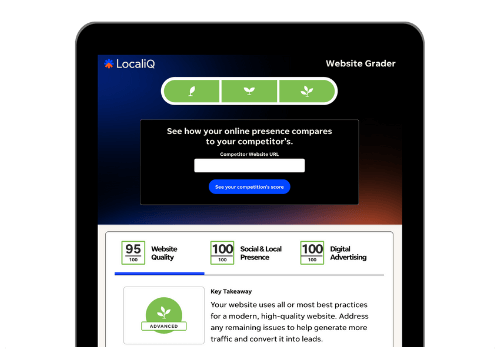We talk a lot about how fast-moving search engines, and Google in general, are. So imagine if your job was keeping up with all the moving parts, all the changes, and all the components that go into making SEO successful, plus managing a team of analysts responsible for managing SEO campaigns?
That’s just what Rob Frost-Dean, our Director of SEO Services, does for LOCALiQ. Rob sat down with us to talk about how search engines have changed in the last decade, what business owners should look for in an SEO partner, and what metrics he thinks are important for defining SEO success.
Hi, Rob! We’re so happy to talk with you today. Tell us how you got your start in the SEO world?
I started with ReachLocal (part of the USA TODAY NETWORK) about four years ago, but I’ve been in the SEO space for well over 10 years. I was previously at an agency handling international e-commerce business for large retailers and managing operations for the team there. I’ve always kind of been around IT and product development, which ties into SEO.
The geeky side of me will tie it all the way back to when I started getting interested in journalism. I worked on the yearbook starting in elementary school all the way through college. So when you think about what you have to put into publishing — whether in print or in websites — there’s a lot of structure that’s similar.
Since you got your start in journalism so young, is it exciting that we’re part of an organization where journalism is such a focus through Gannett?
Yeah, absolutely. I think you need to really think about media in all forms. Social, content, ads, news “ I love the fact that we can now weave all that information together in a holistic manner across the company rather than it being siloed. We still have our specialties, but now we’re able to share and really visualize that data.
So you’ve been in this world for over 10 years — how have things changed in terms of search engines and SEO?
Wow. It’s very fast-moving. I know I liken it, and digital in general, to the world of smartphones. We all started out with the little Nokia, and we were fascinated by the flip phone. Now I can send text messages and see videos on my screen, and we’re moving toward folding screen phones and everything like that. We’re just lightyears ahead of where we were when we first started, and it wasn’t even that long ago.
And that’s what’s transpired in the digital space as well as SEO.
SEO at one point was a little like the Wild West. People were doing whatever they could do to get on search engines, and now there are guidelines that keep you from doing that.
Today, there’s definitely more of a focus on users and quality. It’s about being an expert, being an authority, and being trusted in the space. And you can do that with the information that you’re providing to your customers — not only for your website but for your other digital marketing channels. And things are very focused on personalization — with location, search history, and more. There are a lot of factors.
Why would you say SEO is important for local businesses?
Here’s how I like to explain it to people: Think about a physical brick and mortar business. That’s where everything originated before we went online. You build a business, and you have the storefront, you open it up, you have your inventory organized, and your store looks great — then you never touch it again. Eventually, your store is going to feel outdated. Your merchandise isn’t going to be up to speed for what current customers are looking for, and it’s not going to be following the current trends. People are going to walk away because it’s outdated, it’s dingy.
The same thing happens when you think about your website and your online presence. SEO bridges a number of different opportunities — it’s the look of your website, it’s the development of your site and how it runs, it’s what people are saying about your business, and more. It’s not just one siloed thing — set it and forget it. You need to make sure that you’re staying on top of things, because if you’re not — I guarantee you that your competitors are.
You’ve talked about how much goes into SEO, and most business owners don’t have the time or expertise to do it themselves — so what should they look for in an SEO partner?
You want to make sure your partner understands and gets to know your business. Business owners should look at their SEO partner no different than if they were hiring an employee on their staff in their own office. And that’s one of the things we pride ourselves in being able to do is to build that partnership with each individual client so we can better understand their business.
Business owners should always be looking for someone who wants to consult with them — who is willing to meet on a regular basis to have those conversations and find out what is successful for the business. Or, what isn’t working for the business — because over time that conversation is going to change, especially when it comes to SEO.
And, business owners should look for a partner that can be part of the larger marketing strategy conversation. SEO can be incorporated into and complement a lot of different marketing tactics.
That’s great! And once they find that partner, how can business owners know if their SEO is successful?
A lot of people talk about ranking, but that shouldn’t be the main determination around your performance. And that’s because search is so personalized. You and I can both go out and search the word “dolphins.” And depending on our prior search history, I could get everything regarding the football team, and you could get everything regarding the mammal. It really just depends on what we’re searching for because search engines want to provide those personalized results.
So when we run with just a rank report, we get a false impression of overall performance. It’s like trying to track the stock market on a daily basis — things are going to be moving all the time.
When we think about what’s really important — it’s about the leads being driven. It’s not even necessarily the website metrics — we’re looking at offsite metrics as well. So it’s about people visiting the website, getting directions from listings like Google My Business, or calling the business either from the website or from Google Maps. That’s what we focus on in our SEO program for our clients. We look at everything holistically. And we don’t do the same thing for every client. Just like search engines give personalized results, we look at each client through a personalized lens so we’re creating the strategy and doing the work that helps get them the best results.
Speaking of results, what kind of results can you share with us that your team has helped their clients achieve?
So one of the big things within the last couple of years is featured snippets. Featured snippets are results that Google has deemed likely the most authoritative response to a question. So, we’ve been developing content for clients to help them show in a featured snippet, and we’ve seen a lot more of our clients showing up there. This is really good because it puts you at the top above the organic search results — so you’re owning more space on the page.
That’s so interesting. I was reading an article about how featured snippets are lowering clicks because people are getting their answers from snippets — but it’s still building the brand.
Correct. It’s also why our SEO program is about building the brand and getting that brand awareness. There are plenty of places today that businesses might see a dip in their direct site traffic, but people can be more aware of their brand and are finding them through other sources. We tell our clients that an ideal state is for them to do a search for their business and see what we refer to as brand domination — which would be a full first page of nothing but search results related to their business. So that would be their paid search ads, map listing, all their website stuff, social channels, and reviews.
A lot of the things you mentioned aren’t directly related to SEO — how does that play into a healthy marketing strategy?
I think one really key point is that SEO can’t be a silo. What I see as a successful marketing campaign is that combination of SEO, paid search marketing, social — which includes reputation management, listings. It’s that holistic approach. And I think it’s important to start paid search and SEO hand-in-hand because SEO is a long-game strategy whereas paid search can help you drive leads right away. So if you’re looking for quick ROI, you need paid search, but you need those other things, as well, to be successful long term. That’s what I like about our approach here — our focus is to build the strategy and then figure out what solutions we can utilize to fulfill that strategy.
What do you see as the future of SEO?
Voice search is the thing I’m sure everybody wants to talk about, and it’s definitely where we’re headed. Obviously, voice search is 100% driven off content, and content and SEO go hand-in-hand. If you don’t have the content, and if your content isn’t clear and concise, it’s really going to trip up voice search features.






